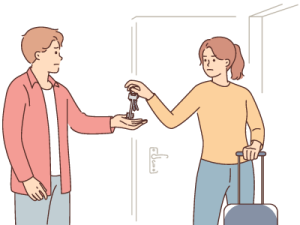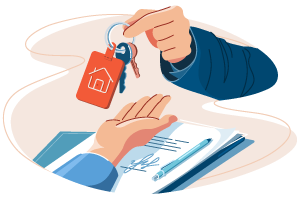Buying Out Jointly Owned Property - The Process
Be certain who you are purchasing a property with, as circumstances often change. One of the owners may want to take over full ownership or get their money out of the property. This change can be due to a separation, family dispute, or an owner looking for an investment opportunity.
Taking an owner off the title deeds involves a transfer of equity, which is a relatively simple transaction. However, you may also need to sever your joint tenancy, obtain mortgage lender consent and watch out for potential tax implications.
How do you buy someone out of a house?
You buy someone out of a house by purchasing the other owner's share of the equity in the property. Doing this will remove them from the title and the mortgage if you have one.
The total equity is the property value minus any outstanding mortgage. The value of their equity is calculated according to their share.
This can become complicated as the person(s) keeping the property and buying the other owner out will become responsible for their share of the mortgage debt. They now need to meet the lender's affordability checks for the full value of the mortgage, on their income alone.
Are you looking to buy out the remaining share of a shared ownership property?
This article is about buying out a jointly owned property when you own the property together.
If you own a share in your home through a shared ownership scheme and want to purchase some or all of the remaining shares from the housing association, read our article on staircasing.
What is the process of buying someone out of a house?
The process of buying someone out of a house is called a transfer of equity, which often occurs when joint owners agree not to sell the property, but instead agree on the payable amount to give up their equity. There are several steps to consider in this process:
- 1
Establish your joint ownership
There are two joint ownerships you need to consider. Joint tenants have equal equity in the property. Tenants in common means owners may not have an equal share of the property. Owners may have a deed of trust to confirm what each owner's shares are.
A deed can have up to 4 owners, both jointly or in common, on a title deed. This can mean multiple parties have to be bought out.
- 2
Split the ownership of a house
When buying out a jointly owned property, the percentage of each owner's shares needs to be established. For joint tenants, the split is 50/50.
If you’re joint tenants in a marriage or civil partnership and getting a divorce or dissolution, the 50/50 split can be overruled by the family court. In this instance, the court might award a 75-25% split in favour of the party who has custody of the kids.
Tenants in common often have a specified share, ranging from 99% to 1%. Controversially, however, someone who has been living in your house and contributing to the household may be entitled to a share through something called constructive trust. In Stack vs Dowden 2005, Lady Hale ruled that the burden of proof falls on the person making the claim of beneficial interest, in opposition with the legal ownership.
When establishing your share, consider your contribution to the deposit as well as mortgage payments and large investments in home improvements.
Book a FREE* 15-minute meeting with a property dispute specialist who will listen to your issue and suggest ways forward, including the costs, with no obligation to use our services after the free meeting.
- What are you due on sale?
- How to sell where one person doesn't want to.
- Mediation and Settlement Agreements.
- Applications to court, including Declaratory Orders, Regulatory Orders, Occupational Rent.
- 3
Getting the property value
Before you can buy someone out of the property, the property needs to be valued, and the total equity calculated. Say the valuation of the property is £500,000; to determine the equity, you need to subtract any debt secured against the property, including mortgages or 'second-charge' debts, as well as the costs of sale. For example:
Total Property Value - (any outstanding mortgage + current value of any Help to Buy loan + estate agent fees + sale conveyancing fees + any auction fees) = total equity.
Then you'll need to work out your shares of the total equity. If you're buying out a joint owner with a 75% share, multiply the total equity by 0.75, for 50% multiply by 0.5, for 25% multiply by 0.25, etc. This is the amount you'll need to pay them to buy them out.
- 4
Get lender consent (if required) to buy your partner out
If you have a mortgage, the affordability checks will have been calculated on the income of all joint owners together. Get your current lender's consent to change the ownership structure of your existing mortgage or get a new mortgage offer. This will be based on the earning capacity of the remaining joint owners which may mean your income alone.
- 5
Get freeholder consent (if leasehold) for buying out a partner
If you own a leasehold property and want to buy out the other party on the title, you'll need to obtain freeholder consent. We recommend using a solicitor to apply for freeholder consent in accordance with the terms of your lease. Provide accounts for all service charges and ground rent. Freeholders usually charge a fee for making changes to the lease.
- 6
Sign the legal documents and forms
The solicitor prepares the TR1 Form for the legal transfer. Both parties sign the form in front of witnesses.
If the party being removed is unrepresented, they will need to complete an ID1 Form before the TR1. If a solicitor acts for them, they will receive Independent Legal Advice on the risks and implications of coming off the title. For example, they will have no future claim over the property.
- 7
Completion
You pay the amount agreed to the leaving owner. Your solicitor will update the Land Registry with the new owners and mortgage details.
Stamp Duty Land Tax will only be payable if the value of the transfer exceeds the threshold. Stamp Duty is not payable if the transfer is part of a divorce, dissolution, separation, or annulment.
Capital Gains Tax is usually not payable if the property is your primary residence due to principal private residence relief. Some gifts to a spouse, partner, or child may also be exempt from Capital Gains Tax.
What can I do if I can't afford to buy out my partner?
There are several ways to finance buying your partner out of their share in the property without needing to sell. These are:
Remortgage - buying out partner on mortgage
If you’re buying out someone from a mortgage but don’t have the finances to do so, you can use your existing equity to buy out the joint owner. This requires you to be able to afford the new mortgage, based on the equity in the property and your income affordability.
Your personal borrowing capacity must cover both shares of the mortgage, as well as the equity to pay off the other owner. You can speak to our panel Mortgage Broker if you need help.
Joint Borrower Sole Proprietor Mortgage
Joint Borrower Sole Proprietor Mortgage is a specific mortgage product that allows family or friends to use their income to support you in getting a larger mortgage than you can on your own, but they won't be legal owners. They are just jointly named on the mortgage.
Adding someone onto the legal title
You could add a new partner, friend, or family member onto the mortgage and legal title to increase your mortgage affordability.
In such cases, a Deed of Trust is best drafted, to manage future occasions where you need to buy out a joint owner.
Gift from a family
You may have a family member who is prepared to gift money to you, to buy out the other owner.
Loan
A loan could be from friends or family and the Loan Agreement could be registered at the Land Registry as security against your property.
If you cannot afford to buy out a joint owner, then you can look to sell and split the equity left after any remaining mortgage and fees are paid from the proceeds. If you can't all agree to sell, then you will need to force the sale.
Forcing a sale is stressful, expensive, and time-consuming. It can prove especially difficult to force a sale if children are living in the property. If the property was intended as a family home, you may not be able to get a court order to force a sale until the youngest reaches 18 years of age.
Book a FREE 15-minute meeting* with a specialist property dispute solicitor/consultant. They'll listen to your issue and suggest ways forward, including the costs, with No Obligation to use our services after the free meeting.
- How can you force a sale?
- What are you due on sale?
- Mediation and Settlement Agreements.
- Applications to court, including Declaratory Orders, Regulatory Orders, Occupational Rent.
How long does it take to buy someone out of a house?
Buying someone out of a house can be as little as four to six weeks if the decision is amicable. However, if there are disagreements, such as how much equity belongs to you, this will be extended.
The process can be completed in a single mediation session in an ideal world. But in some cases, the dispute may go through litigation and even to court. Divorce settlements, for example, could take up to two years.
-
Fast Completions
-
On 99% of Lender Panels
-
ID1 Forms Available Online
-
Local RICS valuations for proof of property value
-
Litigation solicitors to resolve disputes
Andrew started his career in 2000 working within conveyancing solicitor firms and grew hands-on knowledge of a wide variety of conveyancing challenges and solutions. After helping in excess of 50,000 clients in his career, he uses all this experience within his article writing for SAM, mainstream media and his self published book How to Buy a House Without Killing Anyone.
Caragh is an excellent writer and copy editor of books, news articles and editorials. She has written extensively for SAM for a variety of conveyancing, survey, property law and mortgage-related articles.












